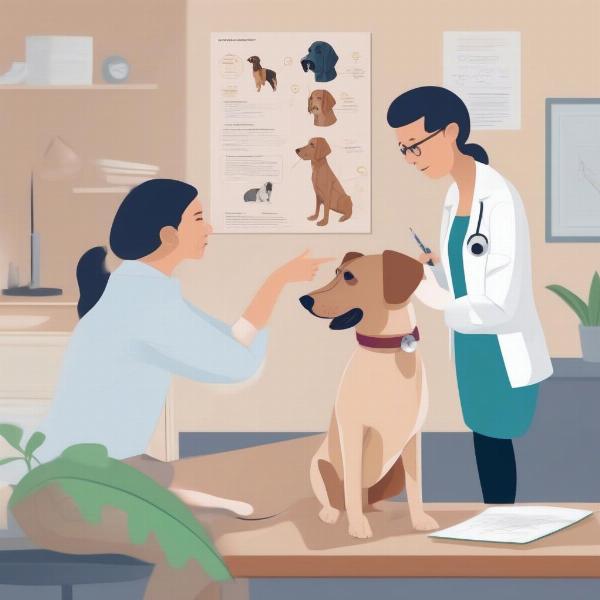Dog medicine spray encompasses a wide variety of products designed to address various canine health issues. From soothing itchy skin to treating infections, these sprays offer a convenient and often less stressful alternative to other medication forms. Understanding the different types of dog medicine sprays, their uses, and how to administer them correctly is crucial for every responsible pet owner. Choosing the right spray depends on your dog’s specific needs and the underlying condition being treated.
Understanding Different Types of Dog Medicine Spray
Dog medicine sprays can be broadly categorized based on their function. Antiseptic sprays, like chlorhexidine sprays, are used to clean and disinfect wounds, preventing infection. Antifungal sprays combat fungal infections like ringworm, while anti-itch sprays provide relief from allergies and other skin irritations. Wound care sprays promote healing and protect injured areas. Some sprays even combine multiple functions, offering broad-spectrum protection. Understanding these distinctions is key to selecting the appropriate spray for your dog’s condition.
Choosing the Right Dog Medicine Spray
Selecting the correct dog medicine spray starts with identifying the underlying issue. Is your dog scratching excessively due to allergies? Is there a visible wound that needs disinfecting? Consulting with a veterinarian is crucial, especially if the condition is persistent or severe. They can accurately diagnose the problem and recommend the most effective spray. fluticasone for dogs might be prescribed for allergies, while a different spray might be necessary for a wound.
How to Administer Dog Medicine Spray
Administering dog medicine spray correctly ensures its effectiveness and minimizes any potential discomfort for your dog. Always follow the instructions on the product label carefully. For topical sprays, hold the bottle a few inches away from your dog’s skin and spray evenly over the affected area. Avoid spraying near the eyes, nose, and mouth. For oral sprays, follow the dosage instructions provided by your veterinarian. chlorhexidine gluconate for dogs is a common antiseptic spray, and its application method might vary slightly depending on the specific product.
Common Concerns with Dog Medicine Spray
Some pet owners express concerns about potential side effects of dog medicine sprays. While most sprays are safe when used as directed, some dogs may experience mild skin irritation or allergic reactions. If you notice any unusual symptoms, discontinue use and consult your vet.
Are Dog Medicine Sprays Effective?
Dog medicine sprays can be highly effective when used appropriately. They provide targeted treatment and can often offer faster relief compared to other medication forms. However, the effectiveness depends on the specific product, the condition being treated, and the individual dog’s response.
When to Consult a Vet
 Consulting with a Veterinarian about Dog Medicine Spray
Consulting with a Veterinarian about Dog Medicine Spray
While many dog medicine sprays are available over-the-counter, it’s always advisable to consult a veterinarian before starting any new treatment. This is especially important if your dog’s condition is severe, doesn’t improve with over-the-counter treatments, or if you are unsure which spray to use. dog grooming puyallup or other grooming services may also provide some advice, but a vet’s diagnosis is essential for proper treatment.
Conclusion
Dog medicine sprays offer a convenient and effective way to address various canine health issues. Understanding the different types of sprays, choosing the right one for your dog’s specific needs, and administering them correctly are crucial for responsible pet ownership. Always consult your veterinarian for diagnosis and treatment recommendations to ensure your dog receives the best possible care. dog wash stations can be a helpful resource for keeping your dog clean and minimizing skin issues, but they are not a substitute for proper veterinary care when medical treatment is necessary. dog eating fly eggs might be a sign of a completely different health issue that may also require treatment.
-
What are the different types of dog medicine sprays available? Dog medicine sprays include antiseptic, antifungal, anti-itch, wound care, and combination sprays.
-
How do I choose the right spray for my dog? Consult your veterinarian for an accurate diagnosis and personalized recommendations.
-
How do I administer dog medicine spray? Follow the instructions on the product label and your veterinarian’s advice.
-
Are there any potential side effects? Some dogs may experience mild skin irritation or allergic reactions.
-
When should I consult a vet? Consult a vet if your dog’s condition is severe, doesn’t improve, or if you’re unsure which spray to use.
-
Can I use dog medicine sprays along with other medications? Consult your vet before combining medications.
-
Where can I purchase dog medicine sprays? Dog medicine sprays can be purchased at pet stores, veterinary clinics, and online.
ILM Dog is a leading international online resource dedicated to providing dog owners with expert advice on all aspects of dog care, from breed selection and health to training, nutrition, grooming, and product recommendations. We offer comprehensive, trustworthy, and practical information to help you provide the best possible care for your canine companion. Whether you’re a seasoned dog owner or just starting your journey, ILM Dog is here to support you every step of the way. Contact us today for more information: Email: [email protected], Phone: +44 20-3965-8624.